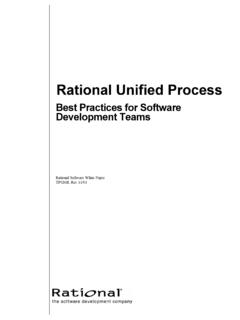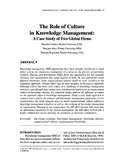Transcription of Strategic Importance of Knowledge Process …
1 Strategic Importance of Knowledge Process outsourcing Alexander Mierau 17 January, 2007 Technical University of Kaiserslautern Germany Alexander Mierau, Strategic Importance of KPO, 2007 2 Contents 1. Introduction .. 3 2. Risks and Benefits of KPO .. 4 3. Strategic Importance of KPO .. 7 4. Future Trends and Strategies of KPO ..12 Alexander Mierau, Strategic Importance of KPO, 2007 31. Introduction The outsourcing Industry has been extensively researched in the past decade. Business Process outsourcing (BPO) in particular has been the topic of many analyses. outsourcing first appeared in the IT industry in the 1980s. This was the time when companies recognized the benefits of having IT service partners in order to develop complex systems, and enhance the way that a business Process or service is managed (Schumacher, 2005).
2 Since then, the outsourcing industry has gone through its introduction and growth stages, with growth rates of around 50%, and has reached its transformation stage. Increasing globalization and high pressure to innovate have substantially shortened the product and service life cycles. Industry life cycles have therefore become shorter and shorter - outsourcing is no exception. Over the past five years a new form of outsourcing has become popular and promises, as BPO once did, huge growth and profit potential. Knowledge Process outsourcing (KPO) is the next step up the outsourcing value chain. While BPO provides extensive Process expertise, KPO is emphasizes on business expertise. KPO indicates a major industry shift, away from execution of standardized processes to carrying out highly complex and customized processes that demand advanced analytical and technical skills as well as decisive judgment (Aggarwal and Pandey, 2004).
3 The major strength of this approach is not the cost-saving aspect but it is more the value that these services provide. They offer a sustainable competitive advantage to its customers in all Knowledge -intensive industries by providing market and industry research, data and statistical analysis, competitive analysis, and support in legal and administration processes. This and similar forms of outsourcing have forced enterprises not only to adjust their organizational and operational structure to the global trend, but also to consider outsourcing in their overall business strategy. Alexander Mierau, Strategic Importance of KPO, 2007 42. Risks and Benefits of KPO Benefits: The main driver for outsourcing is cost reduction.
4 Labour cost savings overseas are just too great to be ignored. In Knowledge -intensive industries such as Analytics and Data Mining Services, Research and Development, and Intellectual Property Research, companies can save significantly as much as 40-50% by offshoring work to low-wage countries. Destinations such as India, China and Russia are ideal for these services as they provide a large pool of engineers and even PhDs at a substantially lower cost. According to Boston Consulting Group, a typical annual salary for an Indian IT engineer is USD 5,000, and for a graduate with a masters degree in Business is USD 7,500 about one tenth of their American equivalents (London, 2006). The cost differential between a PhD in the Sciences and Engineering in the US and in India (or in Russia) can range between USD 60,000 and USD 80,000, respectively.
5 Besides India and Russia, countries such as the Philippines, Chile and Mexico are setting themselves up to provide high-end services at low-end prices as a way to boost employment and help their economies. Hence the increasing competition will drive prices even lower than the existing level (Kakumanu and Partanova, 2006). Another early driver of outsourcing is the shortage of skilled labour. Developed economies such as the US, the UK, and Western European countries are already facing a shortage of highly trained and specialized professionals in some Knowledge -intensive, high-skill sectors, such as R&D in very large scale integration, engineering design, IT, and financial risk management.
6 One way to mitigate these skills shortage is to source talent from low-wage developing countries. India alone produces 441, 000 technical graduates, nearly million other graduates and more than 300, 000 postgradutes every year (London, 2006). Alexander Mierau, Strategic Importance of KPO, 2007 5 According to a NASSCOM-McKinsey study this is about 30% of the available supply of skilled manpower in low-cost countries (Balaji, 2005). Having one or more offshore centers can also provide flexibility in terms of human resource and time management. outsourcing allows companies to add or reduce personnel far easier than a company can do in house, hence avoiding an expensive layoff Process . By utilizing the time difference between different parts of the globe, development can take place constantly.
7 The ability to send massive data amounts anywhere via the internet allows continual collaboration on a large scale (Kakumanu and Partanova, 2006). Risks: One key issue is security. A company can better control access to information and protect equipment when it is in house. In Knowledge Process outsourcing this can include confidential company data, Intellectual Property and Knowledge in general. This awkward situation can be avoided by choosing a partner with international security standards such as the ISO 27000 certification. Other forms of control can be lost as well. The quality of personnel and work cannot be guaranteed. Corporations risk low quality work or massive delays in work because they are in the hands of the outsource service provider.
8 Besides quality, companies also can loose the Knowledge they require to function. If a service provider goes bankrupt, the firm could be in a dire situation. The company cannot even temporarily resume the outsourced roles because the internal Knowledge has been lost. This can again be avoided by focusing on a company s core activities and outsourcing non-core activities (Chanvarasuth, 2005). Public opinion in the United States and Europe can also be a tremendous downside. On the one hand, companies are perceived to be sending jobs overseas, and the perceived loss of high profile jobs can cause poor publicity so that the associated costs in public relations can increase the outsourcing costs, while boycotts and protests can directly Alexander Mierau, Strategic Importance of KPO, 2007 6affect the bottom line.
9 The cost of negotiating, managing, and overseeing a detailed contract can also be great. To alleviate some of the aforementioned risks, a good contract with appropriate incentives, penalties and benchmarks is very important. On the other hand, the protectionist lobby and their anti-BPO drive in the USA and Europe are indirectly helping the proliferation of global offshoring by providing free publicity. Hence this drive has increased not only India s but also China s, Russia s and Mexico s brand images because companies now feel that these outsourcing companies are capable of almost anything. It is very likely that this protectionist movement will help these low-cost companies to improve their brand image and thereby move up the value chain even faster (Aggrawal and Pandey, 2004).
10 Another drawback is the idealized expectations regarding the return on investment and the time it will take. Many firms envision drastic cost savings of up to 80%. A company looking for a quick solution will be frustrated by outsourcing . outsourcing goals that are too high are never reached and they often lead a company to believe that it failed in its implementation when it still achieved major gains. In most cases outsourcing can only show its real potential if it is long-term and partnership oriented. Additionally, legal, language and cultural barriers can cause serious problems. Differences in dealing with problems and conflicts, and a lack of communication between the outsourcing partners can cause friction and inefficiencies.









